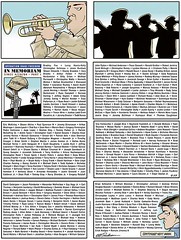State Department officials know better than anyone that the image of the United States has deteriorated around the world. The U.S. is now widely viewed as a brutal, bullying nation that countenances torture and operates hideous prison camps at Guantanamo Bay, Cuba, and in other parts of the world - camps where inmates have been horribly abused, gruesomely humiliated and even killed.Herbert notes that the administration tries for a little window dressing:
The huge and bitter protests of Muslims against the United States last week were touched off by reports that the Koran had been handled disrespectfully by interrogators at Guantanamo. But the anger and rage among Muslims and others had been building for a long time, fueled by indisputable evidence of the atrocious treatment of detainees, terror suspects, wounded prisoners and completely innocent civilians in America's so-called war against terror.
Amnesty International noted last week in its annual report on human rights around the world that more than 500 detainees continue to be held "without charge or trial" at Guantanamo. Locking people up without explaining why, and without giving them a chance to prove their innocence, seems a peculiar way to advance the cause of freedom in the world.
It's now known that many of the individuals swept up and confined at Guantanamo and elsewhere were innocent. The administration says it has evidence it could use to prove the guilt of detainees currently at Guantanamo, but much of the evidence is secret and therefore cannot be revealed.
This is where the war on terror meets Never-Never Land.It's a good, concise summary of just how bad it's gotten, and who let it get this way. (Full column here.)
President Bush's close confidante, Karen Hughes, has been chosen to lead a high-profile State Department effort to repair America's image. The Bush crowd apparently thinks this is a perception problem, as opposed to a potentially catastrophic crisis that will not be eased without substantive policy changes.
This is much more than an image problem. The very idea of what it means to be American is at stake. . . .
In much of the world, the image of the U.S. under Mr. Bush has morphed from an idealized champion of liberty to a heavily armed thug in camouflage fatigues. America is increasingly being seen as a dangerously arrogant military power that is due for a comeuppance. It will take a lot more than Karen Hughes to turn that around.
More background on how the US "thumbs its nose" at human rights here:
In coordinated broadsides from London and Washington, Amnesty International accused the Bush administration on Wednesday of condoning "atrocious" human rights violations, thereby diminishing its moral authority and setting a global example encouraging abuse by other nations.New York Times story here, Amnesty's 2005 Report begins here.
In a string of accusations introducing the organization's annual report in London, Irene Khan, Amnesty's secretary general, listed the abuse of detainees at Abu Ghraib prison in Iraq, the detention of prisoners at Guantanamo Bay, Cuba, and the so-called rendition of prisoners to countries known to practice torture as evidence that the United States "thumbs its nose at the rule of law and human rights."
What do you want to bet some anonymous wingnut reminds me that other countries are worse? As if that's the point.


